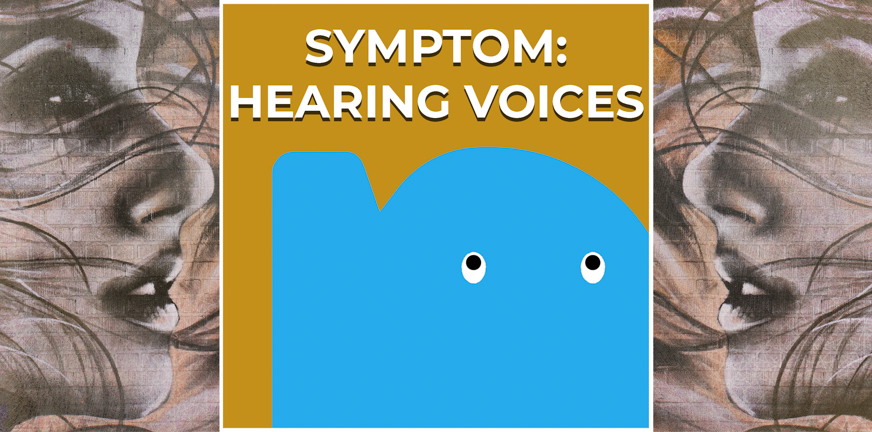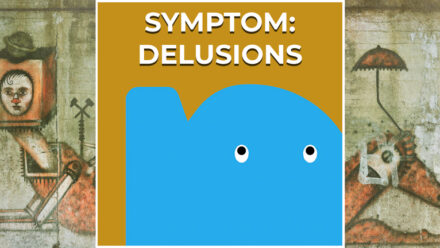
Hearing voices in your head happens to many people. For the voice hearer, the voices are very real but others cannot hear them. A lot of people associate ‘hearing voices’ with schizophrenia. But it is not really that unusual and you can, with the right help, learn to deal with it. Therefore, if people are hearing voices, the diagnosis really should be that: hearing voices.
Calling the experience of hearing voices “schizo” maybe confusing because it distracts from the main problem – which is hearing voices.
Who hears voices?
There is a lot of mystery around hearing voices. Maybe because we do not really know yet what causes it. Like so many mental experiences, hearing voices never has a single clear cause. Usually the cause is a combination of current circumstances and past experiences, particularly childhood adverse experiences.
Is hearing voices something you are born with and in your genes?
Sometimes there are multiple voice hearers in a single family. Although there are known instances where hearing voices was shown to run in the family, there is no clear genetic cause. Things that run in the family may also be caused by traumatic experiences clustering in that family. Some people start hearing voices in their childhood, others at a later age.
People who hear voices, often realise afterwards that their voices started after various factors, such as stress, drug use, a traumatic experience or lack of sleep. Hearing voices is not an illness in its own right, but often connected to other mental conditions like anxiety, depression or drug use.
How your memory deals with hearing sounds and voices
Your memory is like an amazing supercomputer. Only a part of a word, a single sound or a quick glance at an object is enough to tell us what something is. We can hear the difference between a car engine and a motorcycle. When seeing a single flower petal, we understand it belongs to a flower and are able to visualise the complete image. We can even come up with an image that belongs to a sound or a smell. So you do not have to see something to imagine it. With a single piece of the puzzle, your memory uses your imagination to complete the whole image, so to speak.
Sometimes you are convinced you have seen or heard something. But what really happened, is that your imagination replaced your perception with the complete image from your memory. Your expectations play an important role in this: you are not going to expect a bike when you hear a big car.
This process of completing perceptions by memory plays an important role in hearing voices. Actually, your memory is complementing the perception to soon. This often puts you on high alert and makes you respond to sounds or events quickly. People who hear voices can misinterpret a stimulus and see or hear something other than what is really there. This is called hallucinating or auditory hallucinations.
Stress and hearing voices
The influence of stress is often mentioned in relation to hearing voices. People who hear voices, notice that the voices appear stronger or more frequently in times of stress. This is why stress reduction is important in the treatment of people hearing voices. There is always some risk of stress in any situation. Therefore it is important for people hearing voices to find out which kinds of stress are a trigger, so they can learn to deal with it.
People hearing voices who have learned to deal with them, experience the voices as far less bothersome.
Hearing Voices: A recovery & emancipation oriented approach by Robin Timmers
Medication to quiet down the voices
In the past, it was believed that people hearing voices had a mental illness. So the traditional treatment was to give them medications. Currently, treatment has become more and more focused on the personal life history of the voice hearer. Hearing voices in your head is often an effect of emotional events and traumatic experiences that one has not dealt with. The voices may have the identity of someone connected to the traumatic memory.
Antipsychotics may help in getting the voices to calm down, but they do nothing about the cause of the voices. Why are the voices there? What is the problem that causes the voices? With antipsychotics, the person is not learning to deal with the problems. However, treatment with medication can still help to temporarily get to calmer waters, where you can start to learn to deal with the voices.
Talking to the voices in your head
Learning to deal with the voices in your head also means learning to listen to them in a different way. It can be very scary if your voices are commanding you to do something or say rude or mean things to you. In therapy, a lot of people find out that the voices in their head are actually trying to tell them something. By talking to a care worker about their voices, people can find out what their meaning is. There even is a special interviewing method just to find this out.
Psychiatrist Dirk Corstens explains how he talks to voice hearers. He not only talks about what the voices say, but also takes a deeper look into someone’s personal history.
He discovered that many people treat the voices in their head the same as the real people they meet day-to-day. You can probably imagine someone is helped greatly by learning to stand up for oneself when dealing with others AND therefore when dealing with the voices too.
Understanding the message of the voices
Therapy can learn you that what the voices are saying, should often not be taken literally. Like an interpreter, you learn to translate the messages to your personal situation. For the voice hearer this is often a difficult and emotional process, because they have to face what their problems are really about.
Watch the animation “Everbody has psychotic experiences”
Hearing voices is different for everybody. Some people only hear voices at one time in their life and only for a while. While others hear several different voices that never quiet down. Some have voices that talk to one another, other voices can be helpful, or aggressive. Someone who is hearing voices is not necessarily psychotic and not everyone who is psychotic is hearing voices. But generally, people who are prone to psychosis do hear voices more often than people without psychotic vulnerability.
There is a worldwide network of voice hearers and care workers; the hearing voices movement.
Suspicion and voices
People become suspicious when they experience a threatening event they do not understand. You can probably imagine becoming suspicious when you are hearing voices, because you realise that something is wrong. Or because the voices are saying things you can’t make sense of. Becoming very suspicious is then often a symptom of psychosis. This is also called paranoia.
Can you live a normal life when hearing voices?
Most voice hearers learn to deal with the voices in their head, so they are able to function. They have accepted the voices as a part of their everyday life. They are in control of the voices, to some degree. When that is not the case (yet), you can probably imagine that the voices are very scary or tiresome.
Part of recovery is acceptance, talking and interaction. Most voice hearers like to talk and share their experience with other voice hearers in voice hearer groups.
The British Hearing Voices Network is an international support and recovery community for people who hear voices in their head.




